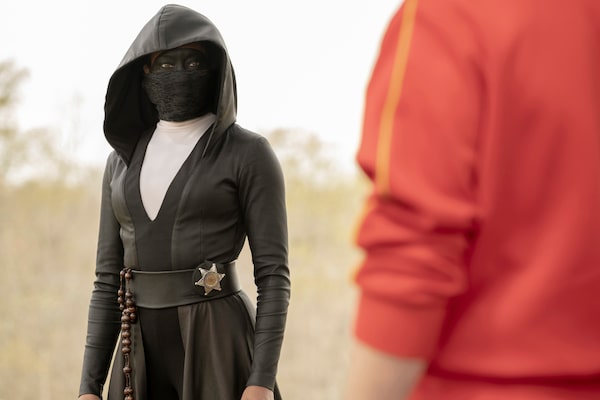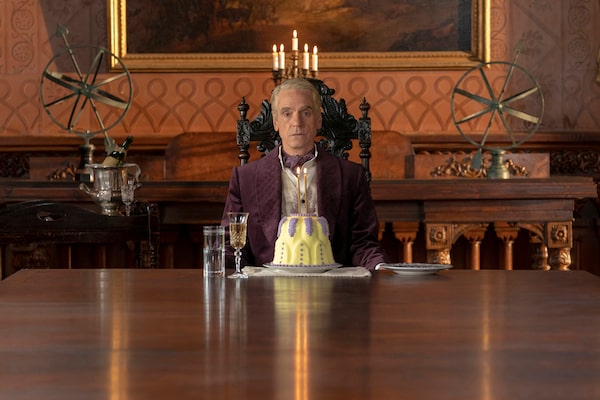
Regina King stars in the new HBO series Watchmen.HBO
The world did not need another Watchmen. Alan Moore and Dave Gibbons’ landmark comic-book series has already been handled and mangled by Hollywood, thanks to Zack Snyder’s 2009 film, an adaptation that mistook faithfulness for purpose, and whose one new idea (a revamped ending) turned out to be a colossal error. But no matter – Watchmen acolytes could always turn back the Doomsday Clock to enjoy the original work, and marvel over and over again in Moore and Gibbons’ gonzo meta-culture fantasy, where superheroes are real, awful and dangerous.
The original DC comic, which ran between 1986 and 1987, is worthy of all hyperbole fans have bestowed upon it – ambitious and whip-smart in its ability to distill a generation’s worth of Cold War paranoia into 12 issues; fantastical in its imagining of what our world might look like had, say, a giant blue god-of-a-man named Dr. Manhattan helped America win the Vietnam War and another masked vigilante assassinate Bob Woodward and Carl Bernstein; and transgressive in its desire to push the boundaries of the comics medium, to paint a previously zippy, benign and primary-coloured world with such ugly thematic brushstrokes. No adaptations required – Watchmen was enough.
So when the news broke in 2017 that HBO was developing a Watchmen series with Damon Lindelof (Lost, The Leftovers), it was hard to feel, well, much of anything. So another big-studio entity would try its hand at exploiting Moore and Gibbons’ world, so what? Let them have at it. But as the series premiere drew closer, and as HBO began to release increasingly intriguing trailers and clips, there was a nagging feeling that this new Watchmen might be ... something. Trouble? Insulting? Maybe even the unthinkable: good?
Shockingly, this new Watchmen is not only good, not only great, it is absolutely necessary. Although the notoriously cranky Moore has long ago disavowed any adaptations of his work – you won’t find his name on Snyder’s movie, nor anywhere in the HBO production’s credits – were he to deign to ever watch what Lindelof and his team have accomplished, there’s strong reason to believe he’d let loose just a tiny little wry smile. HBO’s Watchmen is just that insightful, invigorating and essential.

The series is the second adaptation of Alan Moore and Dave Gibbons's classic graphic novel, following Zack Snyder's 2009 film.HBO/HBO
Sensing the indifference that Snyder’s adaptation has acquired since its release, Lindelof made a smart decision right at the beginning: His Watchmen would not be a retelling. Nor would he go the second-most obvious route and adapt the middling Before Watchmen series of prequel comics that DC pumped out back in 2012. Instead, he would cast his Watchmen into the future – well, our future. Sort of.
Taking place in an alternate 2019, this new Watchmen imagines a world where all the events of Moore and Gibbons’ comic took place – including, yes, that multi-tentacled psychic-blast of an ending. But instead of using the source material to further mine Moore and Gibbons’ preferred themes (the toxicity of nostalgia, the perversion of justice into fascism), Lindelof tells a uniquely modern Watchmen story – one focused on America’s original sin of slavery and how racial hatred has so bled into the national psyche that the line between heroes and villains is forever blurred.
Avoiding obvious settings like New York, where much of Moore and Gibbons' series took place, Lindelof situates his Watchmen in Tulsa, Oklahoma. It's here where racial tensions are the highest in the country, thanks to the lingering pain of the Greenwood Massacre of 1921 (a real and somewhat forgotten moment in American history that Lindelof delicately resurrects here). Robert Redford is currently President of the United States (and entering his 27th year in office), with his plan of reparations for black Americans riling up KKK descendants who call themselves the Seventh Kalvary and have appropriated the masks of masked, now deceased, vigilante Rorschach.

Jeremy Irons plays a mysterious figure who spends his time traipsing about a grand country estate.Colin Hutton/HBO
That’s not nearly all. The Oklahoma police fear for their lives and now wear masks to protect their identity. Caped crusaders are hunted by the FBI, there’s no such thing as the internet or cellphones, the super-powered Dr. Manhattan has left Earth for Mars, and every now and then tiny little extra-dimensional alien squid fall from the sky. Oh, and Jeremy Irons plays a mystery figure who spends his days traipsing around a grand country estate, eating tomatoes grown on trees and ordering around an army of servants who look suspiciously like one another.
If all this sounds like, well, a lot, that’s because it is. Lindelof refuses to hold his audience’s hands as he ventures down some truly weird narrative paths. It is dynamic and bold storytelling, though it will be impenetrable for anyone who hasn’t read Moore and Gibbons’ original series (even those who casually remember Snyder’s movie might be lost, especially once Lindelof starts going deeper into the squid material). For those who are well-versed in all things Watchmen, though, the results are outstanding.
What could have been a crass and easy play at mining intellectual property is given immense purpose by Lindelof’s wild imagination and supreme storytelling abilities. Lindelof’s team of writers, directors, actors, and musicians (Trent Reznor and Atticus Ross provide the show’s thudding, haunting score) play with big, messy ideas and somehow come out the other end looking like tidy geniuses. There’s a conceit used in the sixth episode, for instance, where Lindelof has one character (Regina King’s former Tulsa cop) relive the painful and history-making memories of her grandfather. It could have been a slow-the-story trick that crumbles in lesser hands. Yet Lindelof, no rookie at flashbacks thanks to his time on Lost, does something unexpected and astounding here, reworking the power of narrative to suit his own ends.
Binging the six episodes that HBO provided to critics in advance of the show’s premiere also highlighted just how skilled the network is at premium small-screen storytelling. The production values are high, the cast impressive (in addition to King and Irons, there are wonderful turns from Tim Blake Nelson, Jean Smart, Louis Gossett Jr., James Wolk and Don Johnson), and the sheer weight of the thing immense. As disgustingly fun as Amazon Prime Video’s The Boys can be – it’s that other big superheroes-but-dark series of 2019, remember? – Watchmen makes it look like the cruel etchings of a juice-drunk kindergartner.
Watchmen could, of course, all fall apart in nine weeks’ time. (Lindelof has said the series is meant to be a standalone single season, but so was HBO’s Big Little Lies, so who knows.) But as it stands, Lindelof’s work is one of the most exciting and ambitious projects of the year. And for those who haven’t yet read Moore and Gibbons’ work ahead of the series’ Sunday-evening premiere: there’s no time like the present.
Watchmen premieres Oct. 20 at 9 p.m. on HBO Canada and Crave
 Barry Hertz
Barry Hertz